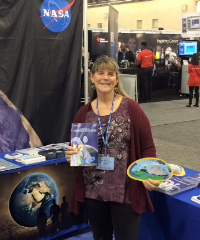Community Blogs
Community Blogs
Discover how the GLOBE community is engaging in all things GLOBE through the community blog posts below.
Learn how to create a GLOBE community blog post.
Filter By:
Blogs List
Have you ever wondered how NASA Earth observing satellites are able to ground truth their data? What about satellites that collect data over the ocean? Is it ever possible to compare actual in situ data with data that is collected using remote sensing? It just so happens that there are several NASA scientists who will be doing just that- and more- from January 24 th through February 20 th ! And, those of us who are involved in the GLOBE Program have been specially invited to participate in several aspects of this research.
We are going to hear from Dr. Ivona Cetinic, the lead ...
Read More »
Posted in:
Curriculum:
SCIENCE AND MATH
Field Campaigns:
EL NIÑO
GLOBE Science Topics:
EARTH AS A SYSTEM
SCIENTIST SKILLS
CLIMATE CHANGE
Investigation Areas:
ATMOSPHERE
EARTH AS A SYSTEM
HYDROSPHERE
BIOSPHERE
Primary Audience:
TEACHERS
STUDENTS
SCIENTISTS
ALUMNI
I just came across an article from NASA's Earth Observatory that was released yesterday entitled " A Dry Start to South America’s Wet Season ". The article describes the current lack of precipitation in South America, and includes the map below. In this map, we are seeing the accumulated deficit of rainfall that is both flowing onto the surface and accumulating under the ground as of this October.
This got me wondering how South America might be impacted by the La Nina conditions in the near future. I did a little research, and found this article, also from NASA's Earth ...
Posted in:
Curriculum:
SCIENCE AND MATH
Field Campaigns:
EL NIÑO
GLOBE Science Topics:
EARTH AS A SYSTEM
CLIMATE
Investigation Areas:
EARTH AS A SYSTEM
HYDROSPHERE
PEDOSPHERE (SOIL)
ATMOSPHERE
BIOSPHERE
One of NASA's scientists, Dr. Stephanie Uz, has been working closely with the GLOBE ENSO Campaign throughout its beginning. She is an oceanographer who studies the response of ocean biology to physical forcing through remotely sensed satellite data, in situ measurements, model output and statistical reconstructions using proxies. Her research focuses on variability in global ocean color or chlorophyll concentrations, the pigment in microscopic phytoplankton, and the physical mechanisms causing those changes. Dr. Uz coordinates communication for the Plankton, Aerosol, Cloud, ocean ...
Posted in:
Curriculum:
EDUCATION RESEARCH
SCIENCE AND MATH
TECHNOLOGY
Field Campaigns:
EL NIÑO
GLOBE Science Topics:
EARTH AS A SYSTEM
SCIENTIST SKILLS
EARTH SYSTEM SCIENCE
CLIMATE CHANGE
CLIMATE
Investigation Areas:
ATMOSPHERE
EARTH AS A SYSTEM
HYDROSPHERE
BIOSPHERE
Learning Activities:
EARTH AS A SYSTEM
ATMOSPHERE AND CLIMATE
HYDROLOGY
Primary Audience:
TRAINERS
TEACHERS
STUDENTS
PARTNERS
SCIENTISTS
ALUMNI
COUNTRY COORDINATORS
Teacher's Guide:
INVESTIGATION AREA DOCUMENTS
Bird Beaks and What they Eat
Overview:
Students identify ideal beak shape for food.
Age:
Upper primary (4th and 5th graders) assisted 1st graders
Materials:
Bird beak/food handout
Straws
Dixie cups
Juice
Tweezers
Bowls
Wild grain rice
Slotted spoons
Cooked noodles (macaroni or similarly shaped)
Chopsticks
Gummy bears
White rice
Scissors
Marshmallows (jumbo)
Plan:
Ask students why birds have beaks and what they are used for - allow time for discussion. Read a book about beaks to the group. I used ...
Posted in:
Curriculum:
SCIENCE AND MATH
GLOBE Science Topics:
GENERAL SCIENCE
Learning Activities:
LAND COVER/BIOLOGY
Primary Audience:
TEACHERS
STUDENTS







